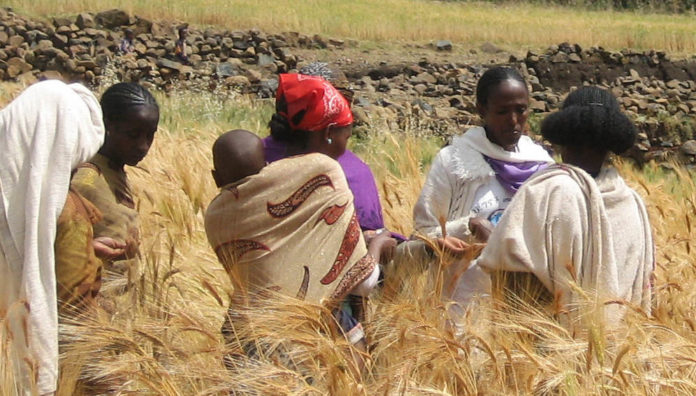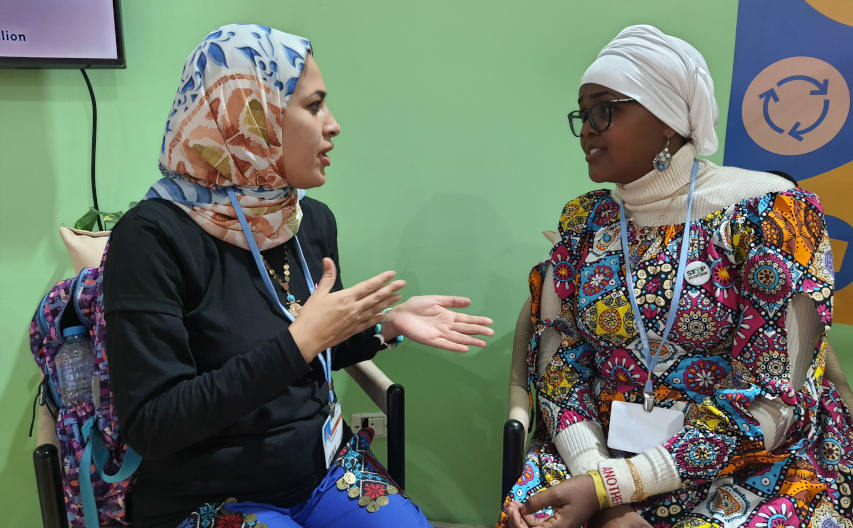
In the Red Sea resort city of Sharm el-Sheikh in Egypt, where heads of state discuss crucial climate-related issues such as loss and damage, mitigation, and adaptation, it is difficult to hear the voices of African female farmers.
But a small representation of them can be found at the COP27 side events organised by NGOs and climate justice activists.
Some of them have come in person from countries currently experiencing prolonged droughts or floods, where farming is impossible and women suffer a lot, while others are participating virtually in these events.
One of the farmers who made it to Egypt is Mana Omar, who came from Kenya where women farmers have to migrate from area to area and wait for rainy seasons, in an attempt to survive.
“Because of droughts, our animals are dying, availability of water is affected, which makes farming impossible. Women in my country have to bring water on their backs for their children and families but they cannot get water on their backs for farming also,” Mana Omar, CEO and founder of the Springs of Arid and Semi-Arid Lands (SASAL), told me.

Omar shared her experience supporting women farmers in Kenya during a session organised by The Ban Ki-Moon Centre for Global Citizens, EmpoderaClima, and YPARD on Gender Day at COP27 (14 November), and explained how her NGO was seeking to build climate resilience in the arid and semi-arid lands of Kenya.
“Voices of women farmers need to be heard in places like COP and to be well represented in decision-making, we need finance for loss and damage for communities like mine that are badly affected by climate change,” Omar added.
A documentary on the Ban Ki-moon Centre project, Elevating the Voices of Women in Agriculture (EVWA), was presented during the session, and included many messages of young women farmers in Africa who support their communities through smart initiatives for adaptation.
“We are working on bringing the voices of female farmers to the level they are heard,” Katrin Harvey, chief operating officer of the Ban Ki-Moon Centre, told me.
“We did a competition and asked young change-makers who are changing the lives of women farmers for the better to apply. We had over 300 applications and chose 30 young change-makers under 30 and today we announce the one who wins the competition among them.”
The EVWA champion 2022 is Lilian Nakigozi, founder and CEO of Women Smiles Uganda, who can’t participate in person but was featured in the documentary. She established the social enterprise in 2018 to improve the lives of women and young girls in underserved communities of Africa, especially those living in urban slums where space is limited, by providing sustainable poverty eradication and food security promotion programmes and agro-entrepreneurship support using vertical farms.
“Our biggest demand is to put more money into adaptation to climate change for smallholders as they are suffering the most, but only a small part of adaptation finance goes to them, especially women farmers,” said Harvey.
I tried to meet representatives of African women farmers attending COP27 and convey their messages on behalf of others who can’t participate themselves.
“This COP has to be accountable. We need a lot of initiatives that can find solutions and we need gender-specific adaptation funding in agriculture and we need young female farmers to be invited to the negotiating table,” said Loureen Akinyi Awuor, a programme officer at the Kenya National Farmers’ Federation.
Ormiel Maganga, national coordinator of Congo Geen, an NGO working to empower women farmers and youth in the Democratic Republic of Congo, told me: “Women farmers reap meagre harvests due to rain pattern delays and sometimes their seeds rot under the ground without [growing into] crops because of the rise in temperature.
She says the farmers want to see more support for capacity building to help them adopt the best adaptive agricultural practices specific to their region. “[They are] calling for scientists to provide more resistant seeds as well as compensation because they’re not responsible for what they’re facing,” Maganga added.
At a number of COP27 side events, photos and videos have depicted the harsh life of women farmers in Africa as they fight climate change, but also their attempts to adapt and the initiatives of smart young women farmers to improve their situation.
These initiatives need support to make them work, ensure their continuity, and scale them up to reach a larger number of female farmers and truly make a difference.
This piece was produced by SciDev.Net’s Global desk, and republished in Transit Magasin under a Creative Commons Attribution License.














